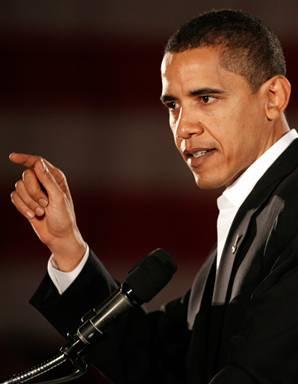In December 2008, in the eleventh hour of two weeks of intense negotiations over the future of a global climate deal, negotiators sat exhausted and exasperated as the team from the United States moved to block a temporary agreement. Visibly frustrated, the lead negotiator for Papua New Guinea growled at the US, “If you can’t lead then get out of the way.” The room exploded in applause, and the US backed down.

President Obama has a choice to make regarding the Robin Hood Tax.
Flash forward three years and the United States, now under what was supposed to be a progressive administration, is standing in the way of other countries’ progress again. This time a coalition of the willing in Europe – led by French president Nicolas Sarkozy and German chancellor Angela Merkel – are laying plans to put a tiny tax on financial speculation by big banks and financiers who treat the global economy like their own personal casino.
A financial speculation tax (a.k.a. FST, Robin Hood tax or financial transaction tax) could raise serious money – on the order of $400 billion per year, and groups that are worried about the impacts of climate change think that this is one of the best proposals out there for generating some of the money developing countries desperately need to adapt to a warming world and to build low-carbon economies.
The Obama administration – and in particular Treasury Secretary Timothy Geithner – has staunchly opposed taxing the Wall Street casino at home. But in a serious overreach of power, they’ve threatened to stop any mention of France and Germany’s proposal for the tiny tax in the G-20 Summit underway in Cannes, France.
In response, major US organizations including Oxfam America, Greenpeace USA, 350.org, and Church World Service States sent President Obama and key members of his administration a letter urging the US to, once again, step out of the way of internatinal progress.
Here’s the full text of the letter, and the list of endorsing organizations:
Dear Mr. President,
We write to urge you to signal support for European countries’ proposal for the G20 summit in November 2011 to endorse countries’ use of a financial transaction tax. It is dismaying that, according to recent reports, your administration has repeatedly objected to European efforts to put such a tax in place, even for themselves. We believe this obstructionism is deeply misguided. A negligible levy on the financial sector has shown great potential to address growing inequities in the financial system, and to help prevent financial crises in the future.
A small tax on the trading of stocks, currencies, derivatives and other financial assets has the power to raise hundreds of billions of dollars a year while discouraging dangerous financial gambling and rapid, high-volume speculative trading. Funds raised by the tax should be used to strengthen broad-based economic prosperity and human security by creating green jobs, improving livelihoods and global health, and following through on critical climate change finance commitments to developing countries.
The idea of a small fee on the sale of financial transactions is not new. Such taxes have a long track record in many of the world’s leading economies. The United States, for example, had a transfer tax from 1914 to 1966, which levied a 0.20 percent tax on all sales or transfers of stock. In 1932, Congress more than doubled the tax to help financial recovery and job creation during the Great Depression.
Today the idea is supported by many G20 leaders, including French President Sarkozy and German Chancellor Merkel, and innovative sources of finance remain high on President Sarkozy’s list of priorities for the G20 Summit. The European Commission recently published legislation for a European financial transactions tax. Bill Gates will formally present a report on development finance at the G20 in which he is expected to identify a financial transaction tax as one of the most credible and feasible sources of innovative finance. The IMF has also published papers noting the feasibility of such a tax.
But, Mr. President, while momentum builds in Europe your administration continues to block progress. We were deeply disappointed when reports from last month’s meeting of European Finance Ministers revealed that Secretary Geithner repeatedly discouraged European countries from moving forward with a financial transaction tax – even amongst a “coalition of the willing.”
Public anger is growing over Wall Street bailouts, record corporate executive excess and broken promises to build a clean economy. The “Occupy” movement is proof of that anger. You have an opportunity to stem this frustration by bringing a message of encouragement for a European financial transaction tax to the G20 Summit.
We, the undersigned organizations, call on your Administration to take a bold stand against Wall Street greed and negligence and stand for accountability and economic justice by supporting European leaders’ action on a financial transaction tax at the G20 in Cannes.
Respectfully yours,
350.org
ActionAid USA
Affording Hope Project
Center for Biological Diversity
Center for Community, Democracy and Ecology
Center for Participatory Research and Development
Center of Concern
Chesapeake Climate Action Network
Church World Service
EcoEquity
FERN
Foreign Policy in Focus
Friends of the Earth U.S.
Grassroots Global Justice Alliance
Greenpeace USA
Holy Cross International Justice Office
International Forum on Globalization
International Rivers
International-Lawyers.org
Jubilee USA Network
KyotoUSA
Maryknoll Office for Global Concerns
Movement Generation: Justice & Ecology Project
Nord-Sud XXI
Oil Change International
Oxfam America
Pacific Environment
Pan Africa Climate Justice Alliance
Stiftung Nord-Süd-Brücken
Sustainable Energy & Economy Network, Institute for Policy Studies
Tax Justice Network USA
United Methodist Church, General Board of Church and Society
Urgewald
Women’s Environment and Development Organization
cc: Secretary Timothy F. Geithner, Department of the Treasury; Michael Froman, Deputy Assistant to the President and Deputy National Security Advisor for International Economic Affairs